Finding the right land use consultant in Los Angeles can make or break a development project. Whether you’re planning a new home, a multi-family project, or a mixed-use development, every step — from zoning analysis to permit approvals — demands expertise.
Table of Contents
ToggleBut with so many consultants in the city, how do you know which firm to trust?
This article explores Los Angeles’ top-rated land use consultants, what makes them stand out, and how to choose the right one for your specific goals.
Let’s start by understanding what these consultants actually do and why their work matters so much in LA’s complex real estate landscape.
What Does a Land Use Consultant Do in Los Angeles?
In Los Angeles, land use consultants are more than just permit helpers. They guide property owners, architects, and developers through one of the toughest approval systems in the country.
A good consultant can interpret zoning codes, anticipate city feedback, and find creative paths to keep your project moving forward. Their job blends technical planning, local law, and strategy — all focused on getting you from concept to construction without delays.
Choosing the Right Land-Use Consultant
Data reference: JDJ Consulting case analysis & LA zoning review norms
Here’s what top land use consultants typically handle:
Zoning and Planning Research: Understanding what’s allowed on your property before design begins.
Entitlement Management: Coordinating city reviews, hearings, and community meetings.
Permit Expediting: Handling every form, document, and revision needed for final approval.
Environmental Review (CEQA): Managing reports for projects that need environmental clearance.
Community Relations: Addressing neighborhood concerns to maintain project support.
These services save months of waiting time — sometimes even years — especially when city departments are backlogged.

Why Los Angeles Needs Expert Land Use Guidance
Los Angeles has more than 35 different zoning designations and dozens of overlay zones. Each comes with its own restrictions, building limits, and required reviews.
That complexity is exactly why land use consulting has become essential in the region. For investors, developers, and even homeowners, getting approvals is not about luck — it’s about strategy and experience.
Key reasons expert guidance matters in LA:
Tight Regulations: From hillside ordinances to coastal zones, rules are layered and detailed.
Long Review Timelines: Many projects face delays simply because paperwork isn’t filed correctly.
Neighborhood Oversight: Public hearings and appeals can stall a project unless handled carefully.
Changing Policies: The city frequently updates zoning laws and environmental rules.
The right consultant keeps up with those shifts and ensures your project stays compliant — and competitive.
Comparison of Common Land Use Services in Los Angeles
To understand how firms differ, here’s a quick breakdown of typical land use consulting services and what they usually include:
| Service Type | What It Involves | Best For |
|---|---|---|
| Zoning Research & Feasibility | Analyzing property codes, setbacks, and allowable uses | Early planning and pre-design phases |
| Entitlement & Permit Expediting | Submitting applications, coordinating city reviews, attending hearings | Active development projects needing approval |
| CEQA & Environmental Review | Preparing impact reports, coordinating consultants, managing responses | Large or sensitive land developments |
| Community Outreach & Representation | Managing neighborhood meetings and addressing public concerns | Mixed-use or high-visibility developments |
| Construction Permit Support | Coordinating final building permits, revisions, and corrections | Projects nearing the construction phase |
Each category may seem simple on paper, but in Los Angeles, the details matter. One small zoning oversight can cost months of rework or even force a redesign.
Below is an overview of some of the most reputable land use consulting firms in Los Angeles. Each firm brings a distinct focus — from residential to commercial and mixed-use development.
1. JDJ Consulting Group
JDJ Consulting Group has become a trusted name for developers, homeowners, and investors across Los Angeles. The firm focuses on zoning analysis, permit expediting, and development strategy, providing end-to-end guidance from concept to approval.
Clients appreciate JDJ’s collaborative process and practical advice. Their team often works closely with city planners and architects to resolve challenges before they delay a project.
JDJ’s approach emphasizes clarity, compliance, and creative solutions — especially for complex zoning or entitlement projects.
Key Strengths:
Expert knowledge of Los Angeles zoning and entitlement codes.
Specialized in permit expediting and development feasibility studies.
Strong communication with city agencies and departments.
Ideal for both residential and commercial developments.
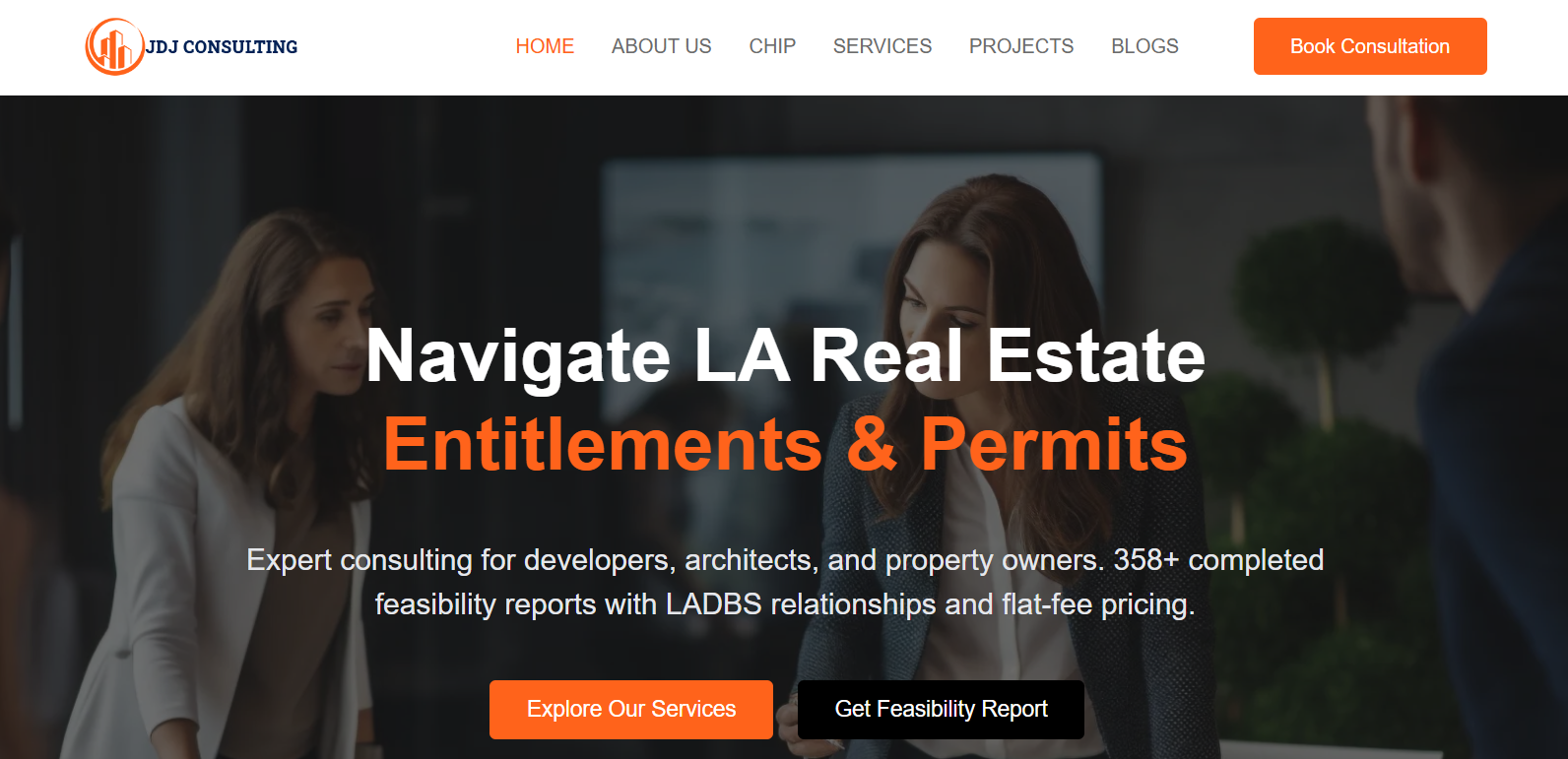
2. Craig Lawson & Co., LLC
Craig Lawson & Co. has worked on some of the most recognizable developments in LA, including large-scale mixed-use projects and multifamily communities. The firm is known for handling complex entitlements and environmental clearances under CEQA.
They also maintain strong relationships with multiple City Council offices, which helps projects stay on track even when community reviews are involved.
Key Strengths:
Decades of experience with major Los Angeles developments.
Comprehensive entitlement and planning services.
Strong community and political connections.
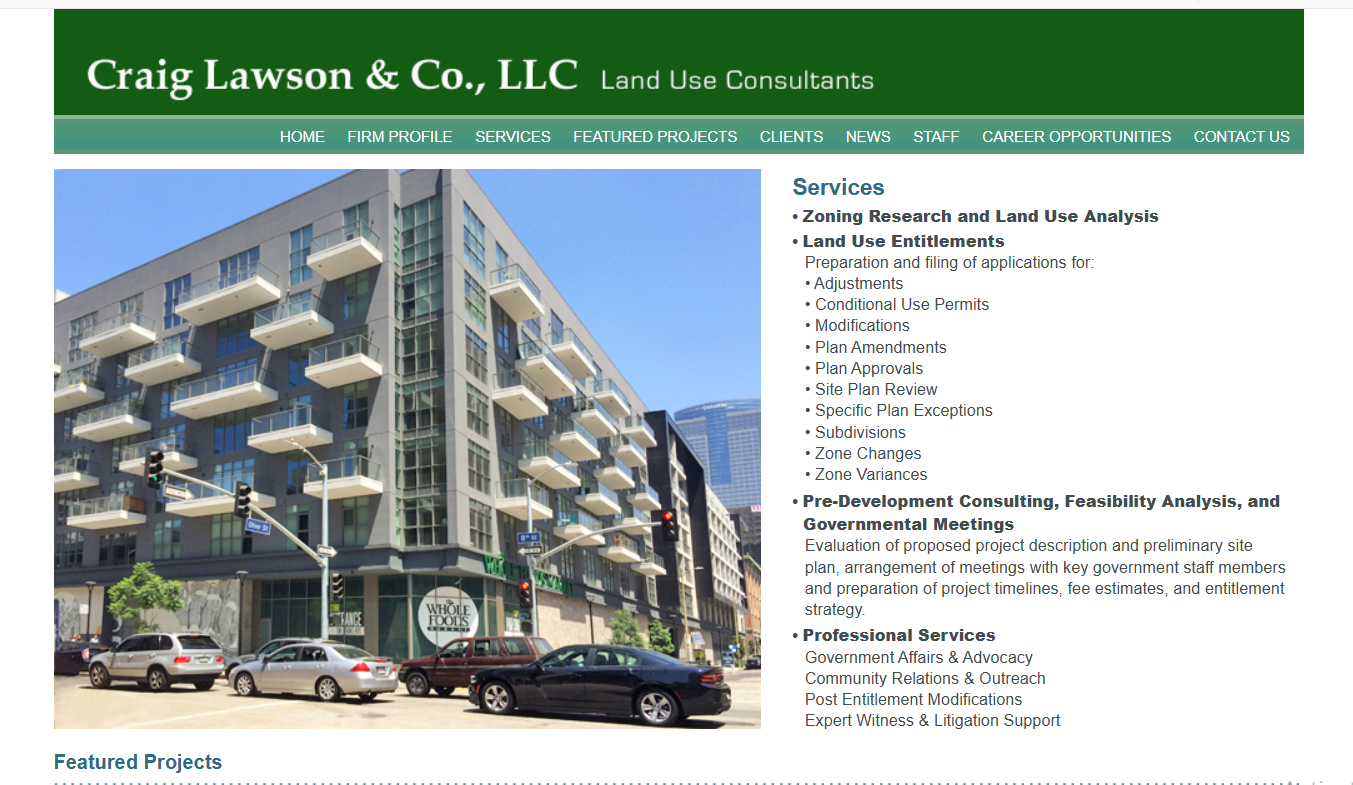
3. Three6ixty
Three6ixty combines planning expertise with modern technology tools. They use digital mapping, data analysis, and visualization to support planning applications and environmental reviews.
The firm’s collaborative work style appeals to architects and design teams looking for data-driven solutions to zoning challenges.
Key Strengths:
Strong focus on urban design integration.
Advanced use of GIS and data visualization.
Ideal for large or design-sensitive projects.

4. Rosenheim & Associates
Rosenheim & Associates is a law and consulting hybrid firm. They specialize in land use law, project entitlements, and zoning variances for both public and private sector clients.
The firm’s legal foundation helps clients who may need representation before planning commissions or appeals boards.
Key Strengths:
Combination of legal and consulting services.
Proven experience with zoning appeals and variances.
Effective for high-stakes or time-sensitive projects.
Comparison of Leading Land Use Consultants in Los Angeles
Here’s a clear snapshot comparing each firm’s areas of expertise and focus:
| Consulting Firm | Main Strengths | Ideal Client Type | Service Range |
|---|---|---|---|
| JDJ Consulting Group | Zoning, permitting, feasibility, and development strategy | Homeowners, developers, investors | Full project cycle from planning to permit |
| Craig Lawson & Co., LLC | Entitlements, CEQA compliance, community outreach | Mixed-use and large-scale developers | Comprehensive entitlement services |
| Three6ixty | Urban design and GIS-based zoning analysis | Architects and urban design teams | Planning and visualization |
| Rosenheim & Associates | Legal and zoning representation | Complex legal or appeal-related projects | Law-integrated land use consulting |
Each of these firms plays a distinct role in the LA development ecosystem. Your choice depends on project type, location, and how much city coordination you need.
How to Choose the Right Land Use Consultant for Your Project
Selecting a consultant isn’t only about credentials — it’s about compatibility and communication. Even the most experienced firm won’t help much if they don’t align with your project’s goals or timeline.
Land-Use Service Breakdown
Source: JDJ Consulting internal survey (2025)
Here’s how you can find the right match for your project in Los Angeles:
1. Clarify Your Project Goals Early
Before hiring anyone, define what success means for your project. Are you looking for help with zoning compliance, faster permitting, or both? Your consultant’s expertise should match your immediate needs and long-term goals.
Tip: A clear project vision helps your consultant build a tailored approval strategy right from the start.
2. Ask About City Experience
Not all consultants have equal experience with every department. Some specialize in planning and zoning, while others handle building and safety permits.
Ask your consultant about:
Their experience with your property’s zoning area.
Which city departments they’ve worked with.
How often they communicate with planners or inspectors.
This gives you a sense of how efficiently they can move your application through city channels.
3. Review Past Projects
A firm’s portfolio says a lot about its strengths. Look for case studies, testimonials, or completed projects similar to yours.
If you’re building a single-family home in Brentwood, a consultant who mainly handles Downtown commercial towers might not be the best fit. Similarly, for multifamily or mixed-use projects, experience with CEQA and public hearings is essential.
Common Challenges in the Los Angeles Land Use Process
Even with a strong plan and capable design team, many projects in Los Angeles still face approval delays. The reason isn’t just slow city processing — it’s the sheer complexity of the system itself.

Each step in the land use process involves multiple reviews, overlapping codes, and public input. A single missing document or outdated report can send your project back for revision.
1. Zoning Conflicts and Code Interpretation
Zoning rules in Los Angeles often vary block by block. For example, a property zoned for R3 might allow multifamily housing — but local overlays, height limits, or neighborhood plans can narrow that permission.
Consultants help interpret those fine details and make sure your architect designs within what’s actually allowed. This avoids design rework later in the process.
2. Lengthy Review and Entitlement Timelines
The entitlement process in LA can take several months, sometimes even longer for complex projects. City departments like Planning, Building & Safety, and Transportation (LADOT) all review parts of the same application.
That means one department’s delay can stall the entire project. Consultants keep those reviews aligned and communicate directly with each office to keep things moving.
3. Environmental Review Requirements (CEQA)
Under California’s CEQA law, certain projects must undergo environmental impact assessments. These studies can be time-consuming and require coordination among several specialists.
Consultants manage this process — hiring the right experts, preparing documentation, and ensuring city responses are handled quickly. Without that oversight, CEQA review alone can delay approvals by months.
4. Community and Political Resistance
Los Angeles is known for active neighborhood councils and community input. Even well-planned developments can face pushback from local residents.
Experienced land use consultants understand how to present a project positively, addressing concerns before they escalate into formal appeals. They help you build trust while maintaining your project’s timeline.
5. Ever-Changing Regulations
City planning policies evolve constantly. Rules around density bonuses, accessory dwelling units (ADUs), or affordable housing incentives change almost every year.
Consultants stay current with these updates and ensure your project aligns with the latest ordinances. That foresight often saves clients from costly redesigns or compliance issues down the road.
How Land Use Consultants Streamline the Approval Timeline
Working with a qualified consultant doesn’t just make the process easier — it often shortens it. Their coordination, local knowledge, and professional relationships can save months in approvals.
Here’s how top-rated consultants in Los Angeles help keep projects on schedule:
1. Early Feasibility and Zoning Analysis
Before any designs are finalized, consultants conduct a detailed zoning and feasibility study. This step identifies possible obstacles early — such as setback limits, parking ratios, or density restrictions.
By clarifying what’s allowed from the start, developers avoid time-consuming redesigns later.
2. Coordinated Submissions and Review Tracking
Consultants prepare and submit all necessary applications in the correct order. They track review progress and stay in contact with each department to ensure no file sits idle.
Many experienced firms even maintain personal communication channels with key city staff, helping to resolve small issues before they cause major hold-ups.
3. Managing Community Relations
Consultants often take the lead during community outreach. They prepare presentation materials, attend neighborhood meetings, and address public concerns directly.
This proactive approach builds transparency and helps minimize opposition during public hearings.
4. Strategic Entitlement Planning
Every entitlement process has multiple layers — zoning adjustments, variances, conditional use permits, and public hearings. Consultants organize these steps efficiently, often combining them where possible to save time.
Their understanding of how departments interact allows them to time submissions strategically, keeping progress continuous rather than sequential.
5. Document and Revision Control
Throughout a project, drawings, reports, and studies go through multiple revisions. Consultants manage document updates, version control, and cross-departmental consistency.
That oversight reduces confusion and keeps all reviewers working from the same information.
Example Timeline: Consultant vs. Independent Application
Here’s a simplified comparison of typical approval durations:
| Project Type | Without Consultant (Avg.) | With Consultant (Avg.) | Time Saved |
|---|---|---|---|
| Single-Family Home Remodel | 6–8 months | 3–4 months | 2–3 months |
| Multifamily or Mixed-Use Project | 12–18 months | 8–10 months | 4–6 months |
| Commercial or Industrial Project | 14–20 months | 10–12 months | 4–8 months |
These are average estimates, but they show a consistent pattern — professional land use guidance nearly always shortens project approval time.
Signs You’re Working with a Reputable Land Use Consultant
Not every consultant who claims experience delivers real results. In Los Angeles, where time and compliance are critical, choosing the right professional can determine your project’s success.
Quiz: Is a Land-Use Consultant Right for You?
Answer the question below and see if you're ready.
Talk to JDJ Consulting Group about your land-use strategy.
Here are a few clear signs that you’re working with a reliable and skilled land use consultant.
1. Clear Communication and Responsiveness
A good consultant keeps you informed at every step. They return calls, explain updates, and ensure you understand what’s happening with your application.
If your consultant goes silent for weeks or struggles to explain city feedback, that’s a red flag. Top-rated consultants make communication a priority because it keeps everyone aligned and prevents costly delays.
2. Documented Success with City Approvals
Reputable consultants can show you their approval track record. They’ll have recent examples of completed projects — ideally in areas with similar zoning or design types as yours.
Look for proof of entitlement success, building permit approvals, and environmental clearance experience. Consistency over time often signals strong working relationships within city departments.
3. Strong Local Knowledge
Every part of Los Angeles has its own development character and zoning layers. From Downtown’s adaptive reuse projects to hillside construction in Bel-Air, each area poses unique challenges.
A top consultant understands these nuances and tailors their approach to each neighborhood’s requirements and community expectations.
4. Transparency About Fees and Timelines
Experienced consultants are upfront about costs and project schedules. They’ll explain which phases require additional review and where unexpected expenses might arise.
Avoid anyone who promises instant approvals or guaranteed outcomes — no consultant can override city procedures. Credible firms provide realistic expectations and help you prepare for each stage with confidence.
5. Collaborative Approach with Other Professionals
Land use consulting works best when integrated with architects, engineers, and legal teams. A reliable consultant communicates effectively with all parties, ensuring the project moves smoothly between design and permitting stages.
When everyone works in sync, delays are minimized and decision-making becomes much faster.
The Future of Land Use Consulting in Los Angeles
As Los Angeles continues to grow, the demand for expert land use guidance is only increasing. The next few years will bring major changes — from new housing incentives to sustainable building initiatives.
Consultants will play a key role in helping property owners, developers, and investors adapt to these evolving standards.
1. Housing Incentives and Density Reform
The city is expanding programs like the Transit-Oriented Communities (TOC) and Housing Element Update to encourage more residential construction. These reforms will create new opportunities — and new regulatory challenges — for builders.
Land use consultants will help clients understand which incentives apply to their properties and how to qualify without triggering added review steps.
2. Environmental and Sustainability Goals
Los Angeles is pushing for greener construction through updated energy codes, water efficiency standards, and emission limits. Consultants are now expected to coordinate environmental documentation alongside building applications.
This shift means consulting firms will increasingly collaborate with sustainability experts, architects, and planners to meet both environmental and zoning goals.
3. Digital Permitting and City Coordination
The City of Los Angeles is gradually digitizing its review process. Platforms like BuildLA are helping streamline submissions, document management, and inter-department coordination.
Future-ready consultants are already adapting to these tools — using online systems to track permits, upload revisions, and maintain project transparency.
That digital fluency will soon become an industry standard.
4. Data-Driven and GIS-Based Planning
Firms are starting to integrate Geographic Information Systems (GIS) and data analytics to predict development feasibility more accurately. By overlaying zoning data with infrastructure and environmental layers, consultants can identify risks before projects begin.
This data-driven approach saves clients time, cuts costs, and supports smarter urban planning decisions.
Why JDJ Consulting Group Stands Out in Los Angeles
Among top-rated consultants in Los Angeles, JDJ Consulting Group continues to distinguish itself through experience, precision, and service quality. Their team combines zoning expertise, local insight, and hands-on coordination to simplify complex approval processes.
What sets JDJ apart is its ability to think strategically while communicating clearly with clients and city staff alike. They don’t just expedite permits — they build strategies that align design, regulation, and timing.
Core Strengths of JDJ Consulting Group:
End-to-end project consulting — from feasibility to final permit.
Proven track record in zoning, entitlement, and community coordination.
Trusted relationships with Los Angeles city departments.
Personalized guidance tailored to each property and client.
Whether you’re developing a new home, a mixed-use project, or an infill site, JDJ provides a clear path through Los Angeles’ complex approval system.

Final Thoughts
Land use consulting in Los Angeles is not just about technical knowledge — it’s about strategy, communication, and experience. Working with a top-rated firm ensures that your investment, time, and project goals stay protected.
The right consultant helps you interpret zoning, plan effectively, and secure approvals without unnecessary setbacks. For property owners, architects, and developers, this expertise is no longer optional — it’s essential.
If you’re ready to make your next project move forward smoothly, reach out to JDJ Consulting Group to schedule a FREE consultation and start planning your path to approval. You can also reach out to us via:
12925 Riverside Dr Suite 302, Sherman Oaks, CA 91423, United States
(818) 793-5058
sales@jdj-consulting.com
FAQs: Top-Rated Land Use Consultants in Los Angeles
What does a land use consultant do in Los Angeles?
A land use consultant in Los Angeles helps property owners, developers, and architects navigate city zoning laws and permitting processes. Their work typically includes:
Researching zoning codes and property restrictions.
Preparing entitlement and permit applications.
Coordinating with city departments for faster approvals.
Managing community and environmental reviews.
They act as your guide to ensure your project meets city regulations and moves forward efficiently.
Why do I need a land use consultant for my project?
Los Angeles has complex zoning laws and layered approval processes. A consultant helps by:
Preventing costly design or code mistakes.
Saving time through coordinated submissions.
Anticipating potential issues with city departments.
Their expertise reduces delays and ensures your project complies with all local regulations before construction begins.
How do I choose the best land use consultant in Los Angeles?
Choosing the right consultant depends on experience, communication, and results. When evaluating firms:
Check their recent project approvals.
Ask about experience with your property’s zoning area.
Review client testimonials and city connections.
Look for transparent pricing and clear timelines.
A trusted consultant combines technical skill with responsiveness and practical insight.
What are the main services land use consultants offer?
Most Los Angeles land use consultants provide:
Zoning and feasibility studies.
Entitlement and permitting coordination.
CEQA and environmental review support.
Community outreach and public hearing preparation.
Project management and communication with city departments.
These services help ensure compliance while keeping development timelines efficient.
How long does the land use approval process take in Los Angeles?
Timelines vary by project type and complexity:
Single-family homes: 3–6 months on average.
Multifamily or mixed-use: 8–12 months.
Commercial or industrial projects: 10–18 months.
Working with an experienced consultant can shorten these durations by coordinating reviews and minimizing revision cycles.
Can a land use consultant help with zoning variances?
Yes. Consultants often assist with variance applications when your project doesn’t fully meet zoning requirements. They:
Prepare justification reports for city planners.
Gather supporting documentation and design evidence.
Represent your project in public hearings.
Their experience helps present your case effectively while complying with city standards.
What’s the difference between a land use consultant and a permit expediter?
While both handle city processes, their focus differs:
Land use consultants manage zoning, entitlements, and strategic planning.
Permit expediters handle technical documentation and submission logistics.
Many firms, like JDJ Consulting Group, combine both services to provide seamless support from planning to final permit.
How does CEQA affect land development projects?
The California Environmental Quality Act (CEQA) requires certain projects to undergo environmental review. Consultants help by:
Coordinating environmental studies.
Preparing and reviewing impact reports.
Ensuring all documentation meets city and state requirements.
This step protects both the environment and the developer’s legal compliance.
Do consultants work with both residential and commercial projects?
Yes. Top Los Angeles consultants assist with a wide range of projects, including:
Single-family homes and ADUs.
Multifamily housing and mixed-use developments.
Retail, office, and industrial properties.
Their services are scalable based on project size and scope.
How much does it cost to hire a land use consultant in Los Angeles?
Costs depend on project complexity and service scope. Typical price ranges:
Basic zoning or feasibility report: $2,000–$5,000.
Full entitlement and permitting: $10,000–$50,000+.
Large-scale or CEQA projects: custom pricing.
Reputable consultants offer transparent estimates and detailed proposals before starting work.
Can a consultant speed up city permit approvals?
Yes. Consultants maintain relationships with city departments and understand how to prepare complete, accurate submissions. This avoids back-and-forth revisions that cause most delays.
They also track review progress, coordinate responses, and handle corrections — keeping your project moving efficiently.
What’s the most common reason for permit delays in Los Angeles?
The biggest causes of delay are incomplete applications and zoning inconsistencies. Common issues include:
Missing technical reports or site data.
Design plans that don’t meet setback or density limits.
Lack of communication between departments.
Consultants identify and resolve these issues before submission, saving time and avoiding rejection.
How do community meetings impact land use approvals?
Community input can significantly affect project timelines. Consultants manage this by:
Preparing outreach presentations.
Addressing concerns before formal hearings.
Adjusting project details to meet community expectations.
Effective communication helps secure neighborhood support and smoother approvals.
What neighborhoods in Los Angeles have the most zoning restrictions?
Areas with strict zoning overlays include:
Pacific Palisades and Bel-Air: fire zone and hillside limitations.
Venice and Westside: coastal and environmental overlays.
Downtown LA: adaptive reuse and design review zones.
A local consultant can help navigate these complex regional requirements.
Can land use consultants represent clients at city hearings?
Yes. Many consultants attend public hearings, planning commission meetings, and neighborhood councils on behalf of clients. They:
Present project details.
Address technical questions from city staff.
Ensure all responses are documented accurately. Representation helps keep communication professional and outcomes favorable.
Are consultants familiar with the BuildLA online system?
Most leading consultants actively use BuildLA, the city’s digital permitting platform. They know how to:
Upload plans and revisions properly.
Track submission status.
Coordinate multi-department reviews electronically. Their experience with online systems prevents administrative delays and lost documents.
What makes JDJ Consulting Group stand out among LA consultants?
JDJ Consulting Group combines technical zoning expertise with strategic project planning. Their team:
Offers personalized guidance from start to finish.
Maintains strong communication with city agencies.
Focuses on reducing delays and ensuring compliance. Clients value JDJ for clear communication, efficiency, and practical problem-solving.
Do I need a consultant for small property renovations?
Even small projects can benefit from consulting, especially if zoning is uncertain. A consultant can:
Confirm what’s allowed on your lot.
Identify permit requirements.
Advise on setbacks, height limits, or design restrictions. This upfront guidance avoids costly changes once your application is in review.
What are entitlements, and why are they important?
Entitlements are the city approvals that grant legal permission to build or change land use. They can include:
Zoning adjustments.
Variances or subdivision approvals. Without entitlements, construction permits cannot proceed. Consultants ensure your project obtains the right entitlements in the correct sequence.
How is the future of land use consulting evolving in Los Angeles?
The future of consulting is becoming more digital, data-driven, and sustainability-focused. Key trends include:
Greater use of GIS mapping and analytics.
Integration of environmental and housing policies.
Collaboration with architects and engineers from early design stages. These shifts make consulting essential for adapting to new city development goals.

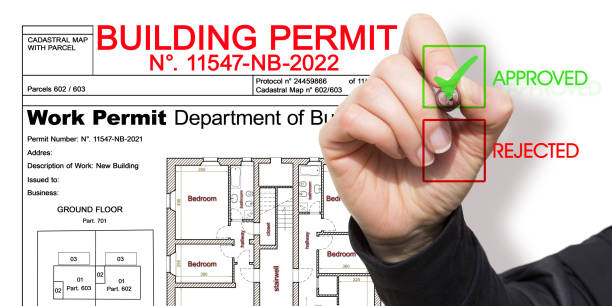


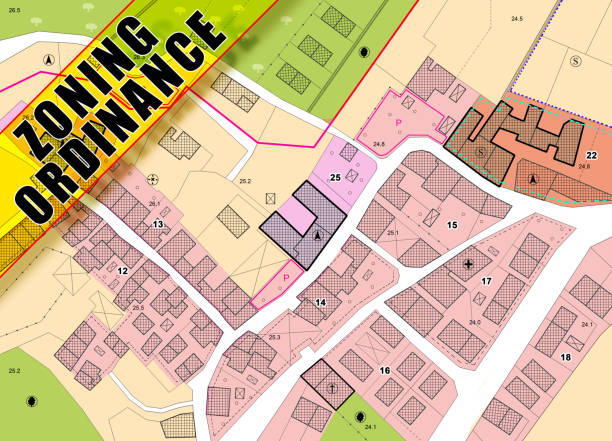
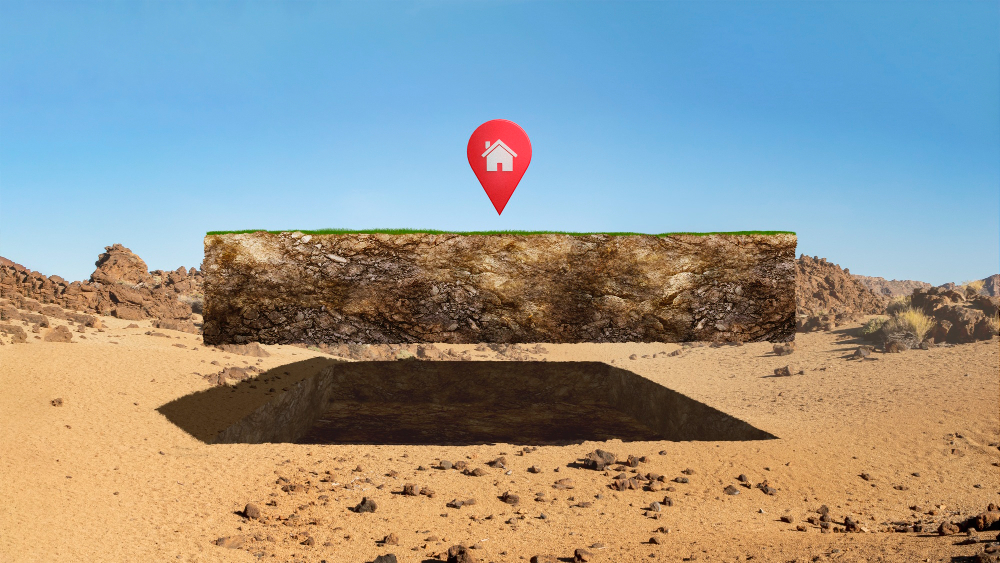

Hello! I sent a request, but have not yet received a response. Perhaps my message did not go through. I would be very grateful if you could contact me via WhatsApp.
wa.me/+79939466590
Hey, thank you for reaching out. Please talk to our consultant on this number:(818) 793-5058